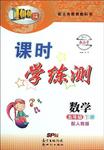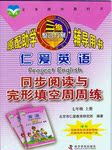题目内容
The leading actor felt________when he saw a lot of people cheering him.
- A.happy
- B.happily
- C.angrily
- D.lovely
解析:
分析:felt是feel的过去式,“感觉到”,用作连系动词,后面跟形容词作表语。(延伸)look(看上去),sound(听上去),smell(闻上去),taste(尝上去),feel(感到,摸上去)用作连系动词,后面跟形容词作表语。这些动词意思改变时就不是连系动词,如:He lookedhappily at the children.(他高兴地看着这些孩子)

 百年学典课时学练测系列答案
百年学典课时学练测系列答案 仁爱英语同步练习册系列答案
仁爱英语同步练习册系列答案

Chinese TV shows that describe young people's lives in modern society are crossing the cultural divide and attracting a lot of foreign audiences.
One of the examples is the Chinese TV series "A Beautiful Daughter-in-law Era", a light comedy about a modern Chinese couple.
The TV series was first aired in Shanghai in November 2009. It was dubbed in Swahili and broadcast in east African countries in 2011. Two Kenyan(肯尼亚人) actresses were chosen to do voice dubbing for the two leading roles in the African version of the series. It was a great success in Africa.
Tanzanians(坦桑尼亚人) say that they are able to understand how young Chinese people live happily in modern times and they may be able to find ways to solve their personal problems by watching the series.
Although China is one of the world's most prolific(多产的) producers of TV series, its series are not particularly popular overseas. The popularity of "A Beautiful Daughter-In-Law Era" may serve as an example for Chinese TV producers who want to bring their work to other countries.
In recent years, some TV series that show the lives of people in Chinese cities have achieved some success in the foreign market.
"Go Lala Go!," a TV series that details the adventures of a female office worker named Du Lala, has also started to reach global audiences. The series has been exported to Singapore, Malaysia, the United States and Canada.
"The Chinese dream will be more easily accepted by foreign audiences when it is manifested in small and touching stories," said Meng Jian, a professor at Fudan University.
【小题1】What can Tanzanians do by watching the Chinese TV series "A Beautiful Daughter-in-law Era"?
| A.They can be chosen to do voice dubbing for the leading roles. |
| B.They can bring their work to other countries. |
| C.They can find ways to solve their personal problems. |
| D.They can be successful at work. |
| A."Go Lala Go!," is very popular in Africa. |
| B.All the Chinese TV series are popular overseas. |
| C.Some Chinese TV series that show the lives of people in Chinese countries have achieved some success in the foreign market. |
| D.Africans can understand the happy lives of Chinese young people in modern times. |
| A.表演 | B.配音 | C.制作 | D.拍摄 |
| A.Cultural crossing | B.Chinese TV shows |
| C.A great success | D.Young people’s lives |
Beijing Opera is also called Peking Opera.. It came into being after 1790 when the famous four Anhui opera troupe(戏班) came to Beijing. Its music and singing(唱腔) came from Xipi and Er-huang in Anhui and Hubei. Its costtumes are all fascinating and artistic.It is the highest expression of the Chinese culture. It’s full of famous stories , beautiful facial paintings, and wonderful gestures and fighting. This kind of opera is very popular with Chinese people.
There are four main roles in Beijing Opera: Sheng ,Dan, Jing and Chou. Sheng is the leading male(男性) actor。For example , a Wusheng is a soldier or fighter .A Xiaosheng is a young man . A Laosheng is the comedy actor or clown.Dan is the female (女性)role 。 Jing,mostly male , is the face-painted role and Chou is the comedy actor or clown.
Stories in Beijing Opera are very intetesting . Some of them are from the history book ,but most of them are from the literature , especially famous novels . The people in the story usually have some disagreements. They become angry and uhappy . They are sad and lonely . Sometimes they are nervous and worried. Then they find a way to make peace . The stories usually end with happiness and lunghter and people are all happy in the end.
【小题1】.Beijing Opera’s singing is from _______.
| A.Anhui and hubei | B.Beijing and Anhui |
| C.the history book | D.the literature and novls |
| A.stories | B.roles | C.gestures | D.Paintings |
| A.honest | B.funny | C.dull | D.serious |
| A. Peking Opera is full of different gestures. |
| B. There are only four roles in Beijing Opera. |
| C. Beijing Opera is the most popular in the world. |
| D. The people in the story usually are in agreement. |
| A.the eading male actor | B.the female role |
| C.the comedy actor or clown. | D.the face-painted role |
Beijing Opera is also called Peking Opera.. It came into being after 1790 when the famous four Anhui opera troupe(戏班) came to Beijing. Its music and singing(唱腔) came from Xipi and Er-huang in Anhui and Hubei. Its costtumes are all fascinating and artistic.It is the highest expression of the Chinese culture. It’s full of famous stories , beautiful facial paintings, and wonderful gestures and fighting. This kind of opera is very popular with Chinese people.
There are four main roles in Beijing Opera: Sheng ,Dan, Jing and Chou. Sheng is the leading male(男性) actor。For example , a Wusheng is a soldier or fighter .A Xiaosheng is a young man . A Laosheng is the comedy actor or clown.Dan is the female (女性)role 。 Jing,mostly male , is the face-painted role and Chou is the comedy actor or clown.
Stories in Beijing Opera are very intetesting . Some of them are from the history book ,but most of them are from the literature , especially famous novels . The people in the story usually have some disagreements. They become angry and uhappy . They are sad and lonely . Sometimes they are nervous and worried. Then they find a way to make peace . The stories usually end with happiness and lunghter and people are all happy in the end.
【小题1】Beijing Opera’s singing is from _______.
| A.Anhui and hubei | B.Beijing and Anhui |
| C.the history book | D.the literature and novls |
| A.stories | B.roles | C.gestures | D.Paintings |
| A.honest | B.funny | C.dull | D.serious |
| A.Peking Opera is full of different gestures. |
| B.There are only four roles in Beijing Opera. |
| C.Beijing Opera is the most popular in the world. |
| D.The people in the story usually are in agreement. |
| A.the eading male actor |
| B.the female role |
| C.the comedy actor or clown |
| D.the face-painted role |
